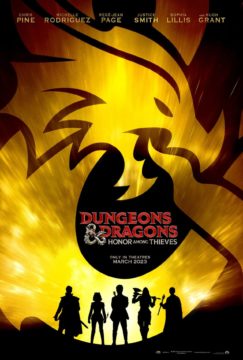 Emily C. Friedman in the LA Review of Books:
Emily C. Friedman in the LA Review of Books:
IN LATE FEBRUARY, Twitter user @ACassDarkly reported the following bewildering conversation around the new film Dungeons & Dragons: Honor Among Thieves, which debuted last weekend:
Person: “I can’t wait for the Dungeons & Dragons movie.”
Me: “Yeah it looks pretty fun.”
Person: “Do you think they’ll stick to the story?”
Me: “…?”
Person: “I just hate it when movies like that don’t stick to the story.”
Me: “The story of Dungeons & Dragons?”
This exchange is humorous because the popular tabletop role-playing game Dungeons & Dragons has no story—or rather, it has hundreds of thousands of stories, crafted at tables around the world, in dozens of languages, by the estimated 50 million current players. Or, as Chris Perkins, senior story designer for D&D, said last week in a promotional D&D Direct event, “What we write, you bring to life.”
But what Wizards of the Coast, the publisher of D&D, writes and sells is only a small portion of the creative material available to players. Game mechanics are not protected by copyright, and the imagined worlds owned by Wizards (such as the Forgotten Realms, the fantasy setting in which Honor Among Thieves takes place) are not required to play the game. “Homebrew” adventures, creatures, settings, and more have always been part of D&D, and over the past two decades, the Open Game License (or OGL) has allowed third-party creators to monetize their creative output with remarkably few restrictions. Publishing D&D content independently or with third-party publishers has now become an established pathway toward working on official D&D products with Wizards. The tabletop role-playing industry as a whole boomed under the OGL, as new companies have formed to provide both supplementary material for D&D and to incubate new game systems.
More here.
